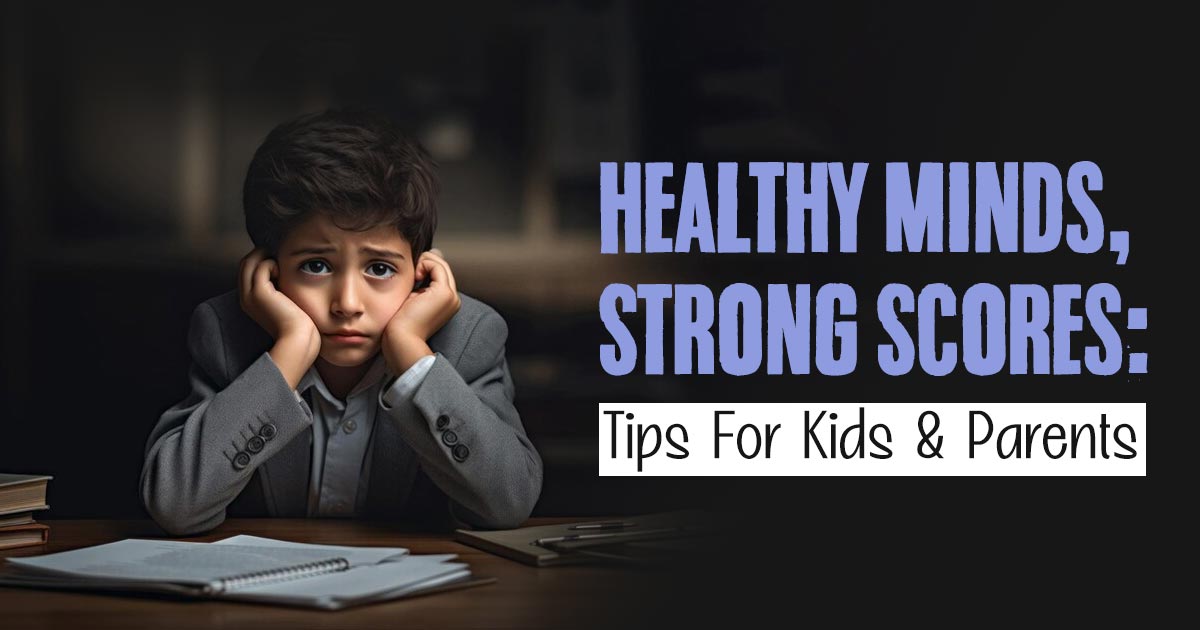Exam anxiety in children is a type of performance anxiety characterized by intense worry, nervousness, and fear before or during an examination. It can manifest physically through symptoms like sweating, trembling, rapid heartbeat, and stomach discomfort. Additionally, it can lead to cognitive symptoms, such as racing thoughts, difficulty concentrating, and self-doubt.
Causes Of Exam Anxiety In Children
A primary cause of exam anxiety in children is the fear of failing or not meeting expectations. Students often internalize external pressures from parents, teachers, and society to perform well academically, which can intensify their anxiety. Inadequate preparation can also contribute to exam anxiety. When students feel unprepared or uncertain about the material, their anxiety levels can skyrocket.
Some students are perfectionists, setting unrealistically high standards for themselves. This perfectionism can lead to crippling anxiety as they strive for flawless performance. Self-criticism and negative self-talk can exacerbate anxiety. Students who constantly doubt their abilities or dwell on past failures are more likely to experience anxiety during exams.
The Consequences Of Untreated Exam Anxiety In Children
Untreated exam anxiety in children can have significant consequences. It can severely impact a student’s ability to perform at their best. High levels of anxiety can disrupt concentration, memory recall, and problem-solving skills. Frequent experiences of poor exam performance due to anxiety can lead to lower self-esteem and reduced self-confidence, potentially affecting a child’s overall sense of self-worth.
Over time, students with exam anxiety may develop avoidance behaviors, such as skipping classes or procrastinating on studying, in an attempt to escape their anxiety triggers. Untreated exam anxiety can have long-term consequences, including academic underachievement, limited career opportunities, and persistent anxiety disorders in adulthood.
Why Addressing Exam Anxiety In Children Matters
Addressing your child’s exam anxiety is essential for their academic success. When anxiety is managed effectively, students can perform at their full potential and achieve their academic goals. Exam anxiety can take a toll on a child’s mental health and overall well-being. By addressing it early, you can help your child develop healthy coping strategies and maintain a positive mental state.
Overcoming exam anxiety can be a confidence-building experience for children. As they learn to manage their anxiety, they become more resilient and self-assured, not only in academics but in various aspects of life. Teaching your child how to cope with anxiety is a valuable life skill. The strategies they learn to manage exam anxiety can be applied to other stressful situations they encounter as they grow and mature.
Strategies To Address Exam Anxiety In Children
Consider the following measures for addressing exam anxiety in children:
1. Open Communication:
Create an open and supportive environment where your child feels comfortable discussing their feelings and concerns about exams. Encourage them to share their thoughts and fears.
2. Positive Reinforcement:
Emphasize the importance of effort and growth rather than solely focusing on grades. Praise your child’s hard work and determination, regardless of the outcome.
3. Effective Study Habits:
Help your child develop effective study habits and time management skills to reduce anxiety stemming from unpreparedness. Encourage regular study breaks and adequate sleep.
4. Relaxation Techniques:
Teach relaxation techniques, such as deep breathing, progressive muscle relaxation, or mindfulness meditation, to help your child manage anxiety during exams.
5. Cognitive-Behavioral Therapy (CBT):
Consider enrolling your child in CBT, a therapeutic approach that can help them reframe negative thoughts and manage anxiety effectively.
6. Professional Guidance:
If your child’s exam anxiety persists or worsens, consider seeking guidance from a mental health professional who specializes in anxiety disorders. They can provide tailored strategies and support.
7. Healthy Lifestyle:
Encourage your child to maintain a healthy lifestyle, including regular exercise, a balanced diet, and sufficient sleep, as these factors can significantly impact anxiety levels.
8. Test-Taking Strategies:
Teach your child effective test-taking strategies, such as reading all questions carefully, managing time wisely, and avoiding the urge to change answers unless certain.
Addressing exam anxiety in children is not only a matter of academic success but also a crucial element in nurturing their mental well-being and building lifelong resilience. By recognizing the causes, consequences, and effective strategies to alleviate exam anxiety, parents and educators can play a pivotal role in empowering children to manage their stress and perform at their best. Ultimately, addressing exam anxiety is an investment in their future, ensuring that they not only excel academically but also lead balanced, fulfilling lives.



